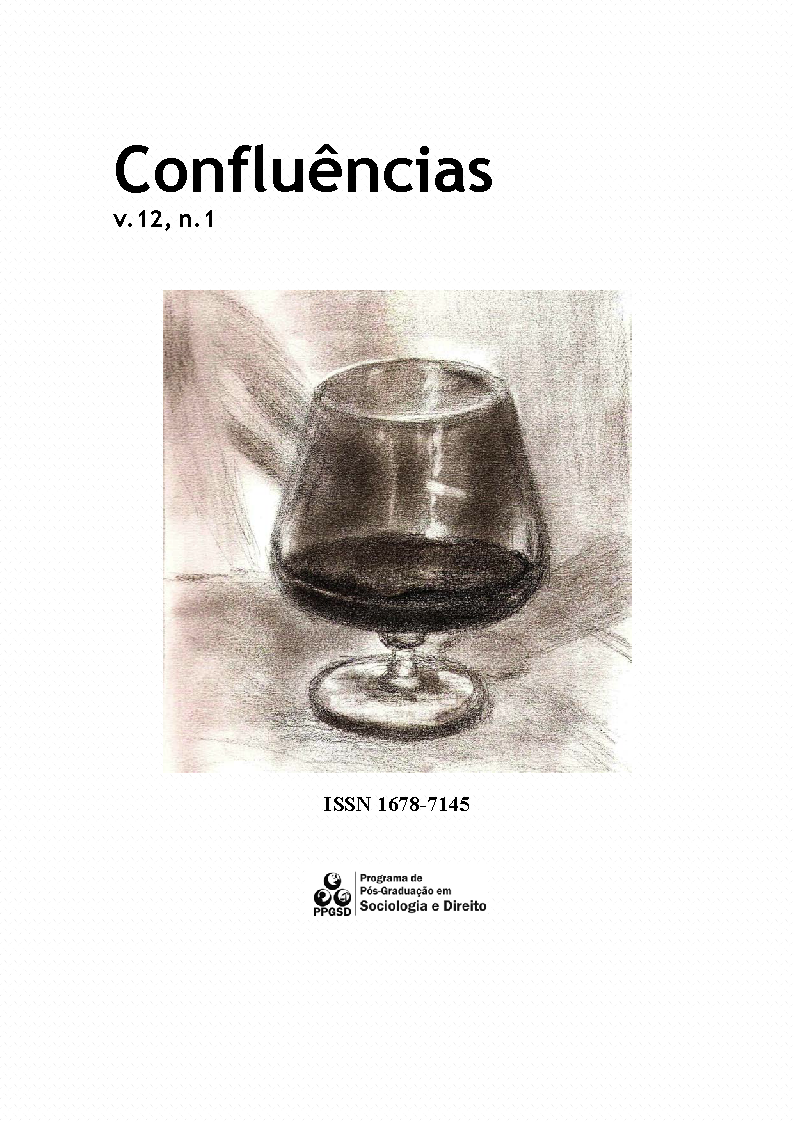Judicialização da política e representação funcional no Brasil contemporâneo uma ameaça à soberania popular?
DOI:
https://doi.org/10.22409/conflu12i1.p90Palavras-chave:
Judicialização, Representaçãofuncional, Soberania popularResumo
O artigo visa analisar o fenômeno da judicialização da política e as suas conseqüências como o fortalecimento das representações funcionais estatais do direito (a exemplo do Ministério Público, da Magistratura, da Defensoria Pública, além de outras agências estatais) mediante a crise das representações políticas tradicionais, como os partidos políticos. O artigo propõe fazer um mapeamento das posições favoráveis ou críticas ao tema que, ou percebem na judicialização a criação de novos canais de representação da sociedade e de exercício de cidadania (C.Neal Tate e T. Vallinder, John Ferejohn, Werneck Vianna, Tereza Sadek) ou as que apontam a judicialização e as representações funcionais uma ameaça à soberania popular (Antoine Garapon, Andréas Kalyvas, Rogério Arantes entre outros), além da possibilidade de formação de uma oligarquia (ou elite) que tutelaria os interesses da sociedade, expressando uma nova forma de autoritarismo estatal, que ao invés de se manifestar no poder executivo, como observou Poulantzas nos anos 1970, encontrar-se-ia no poder judiciário e nas representações funcionais do direito estatal. O texto se divide em quatro partes: a primeira aborda o significado do conceito de judicialização; em seguida, trata da crise de representação política e a ascensão da representação funcional como conseqüência do fenômeno da judicialização política, criando novos canais de absorção de demandas populares por meio das instituições do direito estatal; a terceira expõe as críticas ao processo de judicialização como uma ameaça à soberania popular e expressando uma nova forma de autoritarismo estatal; por fim, a conclusão que percebe o Estado e o conjunto de suas instituições (ou aparelhos) numa perspectiva relacional, entendendo-os como arenas de lutas entre as classes e grupos sociais e permeados de contradições e conflitos, a partir da definição de Poulantzas sobre o Estado e o direito moderno.Downloads
Referências
ARANTES, Rogério Ministério Público e política no Brasil. São Paulo: USP/tese, 2000.
CARVALHO, José Murilo de. Desenvolvimiento de la ciudadania en Brasil. México: Fondo
de Cultura, 1995.
CAPPELLETTI, Mauro. Juízes legisladores? Porto Alegre: Sérgio Antonio Fabris Editor,
FEREJOHN, John. “Judicializing politics, politicizing law”. Hoover Digest, nº 1, 2003.
GARAPON, Antoine. O juiz e a democracia. Rio de Janeiro: Ed. Revan, 1999.
HABERMAS, Jurgen. Teoría de la Acción Comunicativa. Madri: Ed. Taurus Humanidades,
HIRST, Paul. A democracia representativa e seus limites. Rio de Janeiro: Jorge Zahar Editor,
KALYVAS, Andreas. “The stateless theory: Pounlatza’s challenge to postmodernism”. In
Aronowitz, S. e Bratsis, P. (org.). Paradigm lost: State theory reconsidered. Minnesota:
University of Minnesota Press, 2002.
KELSEN, Hans. Teoria geral do Direito e do Estado. São Paulo/Brasília: Martins Fontes/
UnB, 1990.
MACIEL, Débora e KOERNER, Andrei. “Sentidos da judicialização da política: duas
análises”. Lua Nova, nº 57, 2002.
MACIEL, Débora Alves. “Conflito social, meio ambiente, e sistema de justiça: notas sobre o
novo papel do Ministério Público brasileiro na defesa dos interesses difusos”, in Plural n°8.
São Paulo: USP, 2001.
MICHELS, Robert. Sociologia dos partidos políticos. Brasília: Ed. UnB, 1982.
MONTESQUIEU, Charles Secondant. O espírito das leis. Brasília. Brasília: Ed. UnB, 1982.
MOTTA, Luiz Eduardo. Da justiça caritativa à defesa dos novos direitos: a reconfiguração
institucional da Defensoria Pública do Rio de Janeiro. Rio de Janeiro: CEDES/IUPERJ,
NUNES, Edson et alli. Agências Reguladoras e Reforma do Estado no Brasil: inovação e
continuidade no sistema político-institucional. Rio de Janeiro: Ed. Garamond, 2007.
POULANTZAS, Nicos. Poder Político e Classes Sociais. São Paulo, Ed. Martins Fontes,
___________________L’Etat, le Pouvoir et le Socialisme. Paris: Press Universitaires de
France,1978.
SADEK, Maria Tereza. “Ministério Público: a construção de uma nova instituição » in
OLIVEIRA, Ruben George, RIDENTI, Marcelo e BRANDÃO, Gildo Marçal. A Constitução
de 1988 na vida brasileira. São Paulo: ANPOCS/HUCITEC, 2008.
SANTOS, Wanderley Guilherme dos. “Transição em resumo: do passado recente ao futuro
imediato”. Revista Brasileira de Ciências Sociais, n° 1, 1986.
SILVA, Cátia Aída. A Justiça em jogo: novas facetas da atuação dos Promotores de Justiça.
São Paulo: Edusp/Fapesp, 2001.
SOUSA SANTOS, Boaventura. Para uma revolução democrática da justiça. São Paulo:
Cortez, 2008.
SUTIL, Jorge Correa. “Reformas judiciárias na América Latina”. In. PINHEIRO, Paulo
Sergio et alii (orgs.). Democracia, violência e injustiça. São Paulo: Ed. Paz e Terra, 2000.
TATE, C. Neal e VALLINDER, Torbjon. The global expansion of Judicial Power. New
York: New York University Press, 1995.
WERNECK VIANNA, Luiz e BURGOS, Marcelo. Entre princípios e regras (cinco estudos
de ação civil pública). Rio de Janeiro: CEDES/IUPERJ, 2005.
WERNECK VIANNA, Luiz. “O terceiro poder na carta de 1988 e a tradição republicana:
mudança e conversão” In: OLIVEIRA, Ruben George, RIDENTI, Marcelo e BRANDÃO,
Gildo Marçal. A Constituição de 1988 na vida brasileira. São Paulo: ANPOCS/HUCITEC,
Downloads
Publicado
Edição
Seção
Licença
Os autores mantêm os direitos autorais e concedem à revista o direito de primeira publicação, com o trabalho simultaneamente licenciado sob a Licença Creative Commons Attribution que permite o compartilhamento do trabalho com reconhecimento da autoria e publicação inicial nesta revista. Têm autorização para assumir contratos adicionais separadamente, para distribuição não-exclusiva da versão do trabalho publicada nesta revista (ex.: publicar em repositório institucional ou como capítulo de livro), com reconhecimento de autoria e publicação inicial nesta revista. Possuem permissão e são estimulados a publicar e distribuir seu trabalho online (ex.: em repositórios institucionais ou na sua página pessoal) a qualquer ponto antes ou durante o processo editorial, já que isso pode gerar alterações produtivas, bem como aumentar o impacto e a citação do trabalho publicado.







